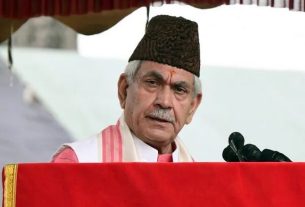In recent years, many people have noticed an unending stream of good news coming from Gilgit-Baltistan (G-B). However, this time it is not the usual suspects; where there is the scaling of another 8000-meter peak by a daring group of alpine climbers, there is more sobering news of yet another glacial lake outburst.
For almost a year now, there have been news and updates on massive strides in key human development sectors in G-B. The region has seen development in smart schools, Information Communication and Technology (ICT)-led pedagogical transformation, digital libraries, STEM and student-led entrepreneurship, including the revival of school meals programmes and student health check-ups – the list indeed is long.
The focus of the latest round of reforms in G-B is on the right path, just as the heart and dedication of those driving this ambitious agenda seem to be in the right place. They are investing in future generations by boosting students’ academic and technology-driven skills, infusing confidence with the help of cutting edge, globally acknowledged technology skill sets, and looking after their health and general wellbeing. There truly couldn’t be a more robust and spot-on agenda for investing in the country’s human development.
All of this has been happening in G-B in the context of Pakistan’s not-so-successful public sector reform experience in recent years. A large number of governance and service delivery reform initiatives were launched in Pakistan, covering education, health, ICT, service delivery, and decentralisation sectors. In most of these interventions, bilateral and multi-lateral development partners were also key stakeholders, both as funding conduits and in terms of providing a reform roadmap. However, a mix of administrative, political-economy, systemic challenges and existing gaps have marred the desired outcomes of these ambitious reform programmes.
The recent successes of human development reforms in G-B, especially in education, ICT and youth-led entrepreneurship, can act as a benchmark for any public sector or social sector reform initiative. In the case of G-B, there was a palpable consensus among key stakeholders – politicians, administrative leads and managers in the technical sectors – around what reforms should be rolled out on priority basis and what trajectory such reform implementation would follow. Once this strategic level consensus was agreed upon unanimously, G-B’s administrative leadership pursued the reform agenda with full zest. Most importantly, attention was paid to the minutest details, and keeping sight of both the larger reform context and the nitty-gritty of the tedious implementation cycle was ensured, removing many bottlenecks to ensure timely completion.
By pursuing the aforementioned course of reform action, there is a praiseworthy list of innovative reforms and success stories for everyone to see. The ‘smart classroom’ initiative spread across G-B’s schools with promising results. The project included sophisticated and state-of-the-art IT software parks, provision of chrome books and offline-online Learning Management Systems (LMS), digital libraries, makerspace labs with robotic systems, 3D printers and electronic kits, tech fellowships, STEM entrepreneurship by highly qualified outsourced faculty. Moreover, ICT dissemination across the business and entrepreneurship ecosystems of G-B is yet another innovative success story from last year. As many as five software IT parks across the region with highly advanced workspaces are already in place, with high-speed internet, 24/7 electricity connectivity, conference halls, and dedicated office space which house several IT start-ups.
Last but not least, efforts are already underway for the sustainability of these ambitious reforms through capacity building and institutionalisation. The G-B government has already designed and rolled out six-month intensive training courses in highly employable and high-earning courses such as data science, artificial intelligence (AI) and blockchain. For the rollout of these capacity-building courses, services of one of Pakistan’s highly acclaimed engineering universities, NUST, have been hired for an estimated 400 participants already.
The triumphs gained by the G-B government last year in the fields of education, ICT, technology-led entrepreneurship and human development are unmatched in terms of their robustness as well as their innovative design and rollout. For the first time, government and administrative leadership (not international donors) have steered the public sector reform agenda, and in hardly a year’s time, the successes and positive results can be seen for everyone to witness.
Foreign and domestic tourists this summer, which have increased in unmatched numbers, will be witnessing a new glow in the eyes of students of G-B and a new resolve on the faces of its citizens as they visit this earthly heaven.__Tribune.com





